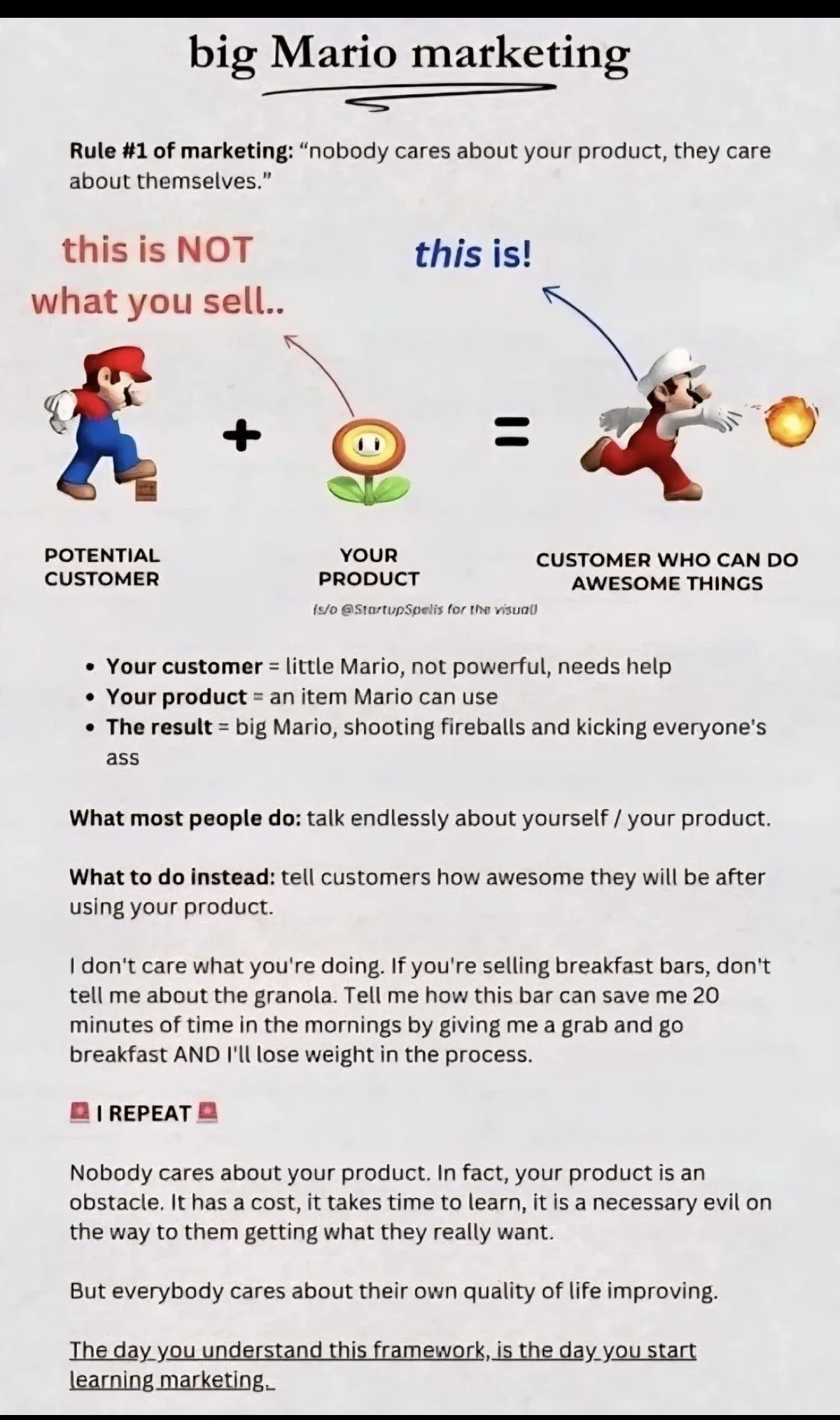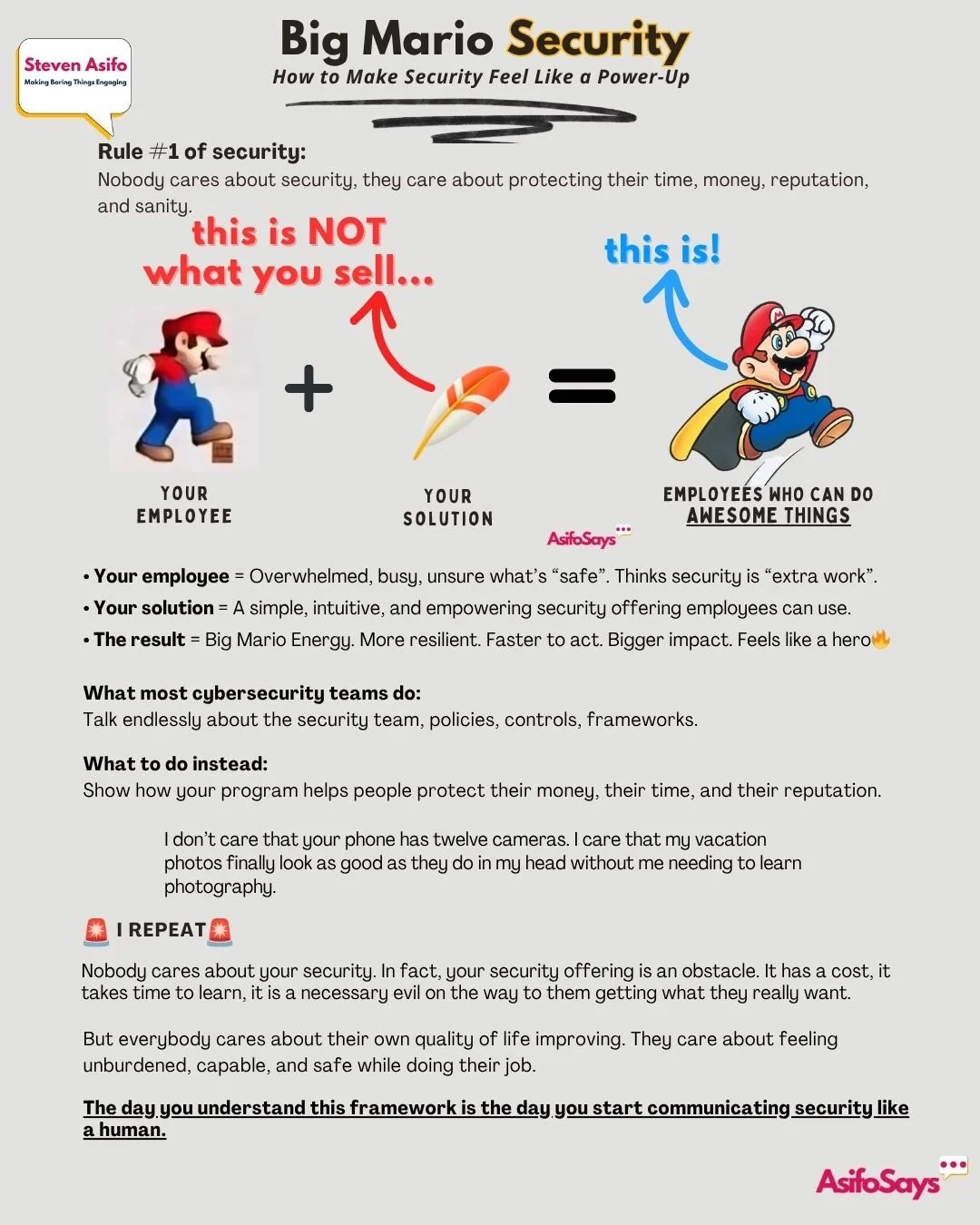How to Make Security Feel Like a Power-Up (Big Mario Security)
Rule #1 of security:
Nobody cares about security. They care about protecting their time, money, reputation, and sanity.
That’s the starting point.
And once you accept that, everything about how you communicate security changes.
Most security teams talk about tools, controls, frameworks, phishing modules, and policies.
Employees just want to get their work done without feeling confused, slowed down, or embarrassed.
Here’s the framework I use when helping companies make cybersecurity feel intuitive, helpful, and fun (believe it or not).
Special Shoutout!
Before I go deeper, I need to give credit where it’s due.
This whole framework was inspired by a brilliant concept I stumbled upon called on Twitter (X?) Big Mario Marketing.
The idea was simple, but it summed up what I believe in an interesting way:
People don’t buy the ingredient. They buy the transformation.
Not the granola bar…
but the “I get 20 extra minutes of my morning back.”
Not the fancy camera specs…
but “my vacation photos finally look the way they do in my head.”
That unlocked something for me.
Because cybersecurity has the same exact problem.
Most teams talk about what’s inside the box: controls, policies, MFA, frameworks, SSO, least privilege.
Employees don’t care about any of that.
What they do care about is what those things unlock for them.
Which is where the Mario analogy comes in.
When Mario grabs a mushroom, he doesn’t celebrate the mushroom.
He celebrates the power-up. He becomes bigger, stronger, and harder to knock down.
Security should feel the same way.
Your employees shouldn’t feel like they’re being handed chores. They should feel like they’re being handed power.
A power-up that makes them:
quicker to act
more resilient
more confident
That’s “Big Mario Security.”
And once I saw it through that lens, this idea for a communication strategy manifested.
This Is NOT What You Sell
🧑💻 Your security tool, policy, training, or control.
No one wakes up wanting to “enable MFA,” “review permissions,” or “complete security training before COB.”
These are ingredients.
Not the meal.
This Is What You Actually Sell
🦸♂️ An organization where the safest choice is the easiest choice.
When you simplify security, you’re not selling a tool.
You’re selling outcomes.
Protecting employees from abuse.
Helping them avoid losing money.
Saving them time when things inevitably go wrong.
Giving them confidence that they can spot suspicious behavior.
That transformation. Going from unsure to empowered.
Your Employee vs. Your Solution
Your Employee Right Now:
Overwhelmed and busy
Unsure what’s “safe to click”
Thinks security is “extra work”
Your Solution Should Be:
Simple
Intuitive
Empowering
The Result: Big Mario Energy 🍄🔥
Your employees become:
More resilient
Faster to act
Able to make safer decisions without thinking twice
They feel like heroes and not victims.
That’s Big Mario Energy: when the security program acts like a power-up that helps them get further, faster.
What Most Cybersecurity Teams Do
They talk endlessly about:
The security team
The policies
The controls
blah
blah
blahhhh
What to Do Instead
Show people how your security program helps them protect:
Their money
Their time
Their reputation
Their sanity
That’s what they actually care about.
Think of it like buying a phone:
You don’t care that your phone has twelve cameras.
You care that my vacation photos finally look as good as they do in your head—without needing to learn photography.
People care about outcomes, not features.
🚨 Repeat After Me
Nobody cares about your security stack.
Nobody cares about your tools, policies, or posture.
They care about their own quality of life getting better.
They care about feeling unburdened, capable, and safe while doing their job.
Your security solution is the super mushroom, not the goal.
Their empowerment is the Big Mario moment.
The Moment This Clicks…
The moment you understand this framework—
the moment you shift from “Here’s our security program” to
“Here’s how we help you protect the things that matter most to you”—
…is the day you start communicating security like a human.
And that’s when your organization finally levels up.


